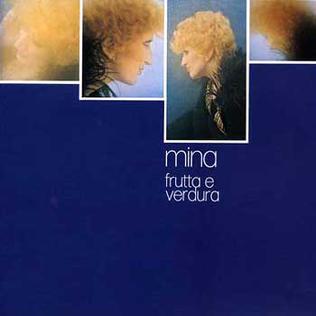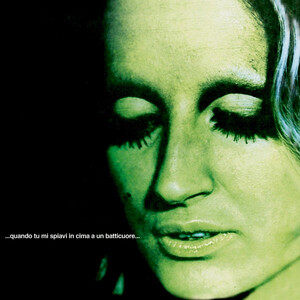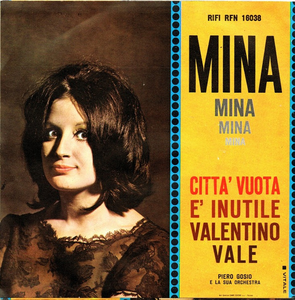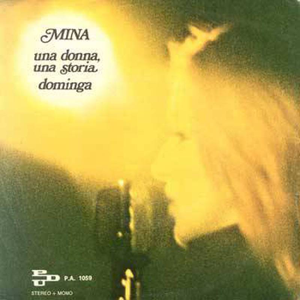
Mina Anna Mazzini or Mina Anna Quaini, known mononymously as Mina, is an Italian singer and actress. She was a staple of television variety shows and a dominant figure in Italian pop music from the 1960s to the mid-1970s, known for her three-octave vocal range, the agility of her soprano voice, and her image as an emancipated woman.

Giuseppe "Pino" Donaggio is an Italian musician, singer, and composer of film and television scores. A classically-trained violinist, Donaggio is known for his collaborations with director Brian De Palma, and for his work in both European and American genre cinema. He has won two Italian Golden Globe Awards, and has been nominated for two David di Donatello, four Golden Ciak, two Nastro d'Argento, and a Saturn Award.
"You Don't Have to Say You Love Me" is the English-language version of the 1965 Italian song ”Io che non vivo," written by Pino Donaggio and Vito Pallavicini. The English lyrics were written for Dusty Springfield by Vicki Wickham and Simon Napier-Bell.

Frutta e verdura is a studio album by Italian singer Mina, released in October 1973 by PDU and originally distributed by EMI Italiana as a double album along with Amanti di valore. This pair of albums spent eight consecutive weeks at the first place of the Italian chart.

Mina is a studio album by Italian singer Mina, released in 1971 by her own label, PDU.

...quando tu mi spiavi in cima a un batticuore... is a studio album by Italian singer Mina, released in November 1970 by PDU.

...bugiardo più che mai... più incosciente che mai... is a studio album by Italian singer Mina, released in November 1969 by PDU.

Studio Uno 66 is a studio album by Italian singer Mina, released in June 1966 by Ri-Fi.
Vito Pallavicini was an Italian lyricist.

"Il cielo in una stanza" is a song written by Gino Paoli and originally recorded by Italian singer Mina for the album of the same name. The song was released as a single in June 1960 by Italdisc. It became a commercial success in Italy, topping the charts for eleven consecutive weeks and later returning to number one for three additional weeks. It is also Mina's best-selling single in Italy, with estimated sales of 400.000 copies.

Salomè is a double studio album by Italian singer Mina, released in November 1981 by PDU and distributed by EMI Italiana.

"Come sinfonia" is a 1961 Italian song composed by Pino Donaggio. The song premiered at the 11th edition of the Sanremo Music Festival, with a double performance by Donaggio and Teddy Reno, and placed at the sixth place. In spite of its placement, it was then referred to by several critics as the song of the year and as an instant classic.

Italian singer Mina has released 159 official singles and 63 promotional singles.

"Città vuota" is a song recorded by Italian singer Mina in 1963. This song is Italian version of "It's a Lonely Town" by Gene McDaniels. The song was written by Doc Pomus, Mort Shuman, and adapted by Giuseppe Cassia.

"Un anno d'amore" is a song recorded by Italian singer Mina. The song is a cover version of the French song "C'est irréparable", originally written and recorded by Nino Ferrer. The Italian lyrics were written by Mogol and Alberto Testa. The song is arranged by Augusto Martelli.

"Le mille bolle blu" is a 1961 Italian song composed by Vito Pallavicini and Carlo Alberto Rossi. Together with "Io amo, tu ami", the song was the Mina's entry at the eleventh edition of the Sanremo Music Festival, where it was presented in a double performance with Jenny Luna. It replaced "Come sinfonia", which originally was meant to be performed by Mina together with its composer Pino Donaggio. In spite of being the favorite, it only placed at the fifth place. Despite its initial tepid response, it eventually became one of Mina's signature songs, and during the years has been used in films, television themes, and commercials.

"Una donna, una storia" is a song by Italian singer Mina, recorded for her 1970 studio album ...quando tu mi spiavi in cima a un batticuore.... It was written by Gianni Ferrio and Antonio Amurri. Released in February 1971 as the second single from the album, the song reached number nine on the Italian chart, staying there for 12 weeks. "Dominga", which is an Italian cover version of the Portuguese song "Domingas" by Jorge Ben Jor, was used as the B-side of the single.

"Un buco nella sabbia" is a song by Italian singer Mina, written by Piero Soffici and Alberto Testa. The song was released as a single, reaching number 7 on the Italian chart, and was later included in the album Studio Uno (1965).

"Stessa spiaggia, stesso mare" is a song written by Piero Soffici and Mogol. Italian singer Piero Focaccia was the first to record the song, but Mina released the song about a month earlier. It is noteworthy that Mina uses the same arrangement as in the original, rather than adapting it for herself as she used to do with cover versions.

"Sono come tu mi vuoi" is a 1966 song by Italian singer Mina.


















